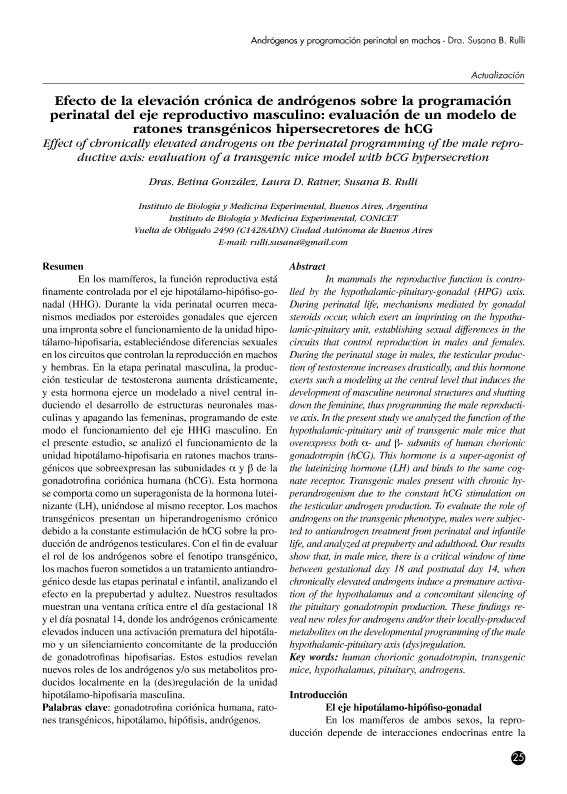Artículo
En los mamíferos, la función reproductiva está finamente controlada por el eje hipotálamo-hipófiso-gonadal (HHG). Durante la vida perinatal ocurren mecanismos mediados por esteroides gonadales que ejercen una impronta sobre el funcionamiento de la unidad hipotálamo-hipofisaria, estableciéndose diferencias sexuales en los circuitos que controlan la reproducción en machos y hembras. En la etapa perinatal masculina, la producción testicular de testosterona aumenta drásticamente, y esta hormona ejerce un modelado a nivel central induciendo el desarrollo de estructuras neuronales masculinas y apagando las femeninas, programando de este modo el funcionamiento del eje HHG masculino. En el presente estudio, se analizó el funcionamiento de la unidad hipotálamo-hipofisaria en ratones machos transgénicos que sobreexpresan las subunidades α y β de la gonadotrofina coriónica humana (hCG). Esta hormona se comporta como un superagonista de la hormona luteinizante (LH), uniéndose al mismo receptor. Los machos transgénicos presentan un hiperandrogenismo crónico debido a la constante estimulación de hCG sobre la producción de andrógenos testiculares. Con el fin de evaluar el rol de los andrógenos sobre el fenotipo transgénico, los machos fueron sometidos a un tratamiento antiandrogénico desde las etapas perinatal e infantil, analizando el efecto en la prepubertad y adultez. Nuestros resultados muestran una ventana crítica entre el día gestacional 18 y el día posnatal 14, donde los andrógenos crónicamente elevados inducen una activación prematura del hipotálamo y un silenciamiento concomitante de la producción de gonadotrofinas hipofisarias. Estos estudios revelan nuevos roles de los andrógenos y/o sus metabolitos producidos localmente en la (des)regulación de la unidad hipotálamo-hipofisaria masculina. In mammals the reproductive function is controlled by the hypothalamic-pituitary-gonadal (HPG) axis. During perinatal life, mechanisms mediated by gonadal steroids occur, which exert an imprinting on the hypothalamic-pituitary unit, establishing sexual differences in the circuits that control reproduction in males and females. During the perinatal stage in males, the testicular production of testosterone increases drastically, and this hormone exerts such a modeling at the central level that induces the development of masculine neuronal structures and shutting down the feminine, thus programming the male reproductive axis. In the present study we analyzed the function of the hypothalamic-pituitary unit of transgenic male mice that overexpress both α- and β- subunits of human chorionic gonadotropin (hCG). This hormone is a super-agonist of the luteinizing hormone (LH) and binds to the same cognate receptor. Transgenic males present with chronic hyperandrogenism due to the constant hCG stimulation on the testicular androgen production. To evaluate the role of androgens on the transgenic phenotype, males were subjected to antiandrogen treatment from perinatal and infantile life, and analyzed at prepuberty and adulthood. Our results show that, in male mice, there is a critical window of time between gestational day 18 and postnatal day 14, when chronically elevated androgens induce a premature activation of the hypothalamus and a concomitant silencing of the pituitary gonadotropin production. These findings reveal new roles for androgens and/or their locally-produced metabolites on the developmental programming of the male hypothalamic-pituitary axis (dys)regulation.
Efecto de la elevación crónica de andrógenos sobre la programación perinatal del eje reproductivo masculino: evaluación de un modelo de ratones transgénicos hipersecretores de hCG
Título:
Effect of chronically elevated androgens on the perinatal programming of the male reproductive axis: evaluation of a transgenic mice model with hCG hypersecretion
Fecha de publicación:
08/2011
Editorial:
Sociedad Argentina de Endocrinología, Ginecologica y Reproductiva
Revista:
Sociedad Argentina de Endocrinología, Ginecologica y Reproductiva
ISSN:
1515-8845
Idioma:
Español
Tipo de recurso:
Artículo publicado
Clasificación temática:
Resumen
Archivos asociados
Licencia
Identificadores
Colecciones
Articulos(IBYME)
Articulos de INST.DE BIOLOGIA Y MEDICINA EXPERIMENTAL (I)
Articulos de INST.DE BIOLOGIA Y MEDICINA EXPERIMENTAL (I)
Citación
Gonzalez, Betina; Ratner, Laura Daniela; Rulli, Susana Beatriz; Efecto de la elevación crónica de andrógenos sobre la programación perinatal del eje reproductivo masculino: evaluación de un modelo de ratones transgénicos hipersecretores de hCG; Sociedad Argentina de Endocrinología, Ginecologica y Reproductiva; Sociedad Argentina de Endocrinología, Ginecologica y Reproductiva; 18; 2; 8-2011; 25-39
Compartir




